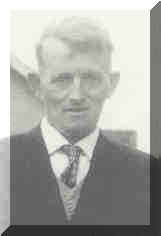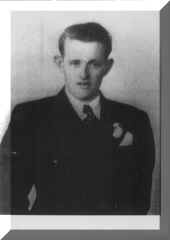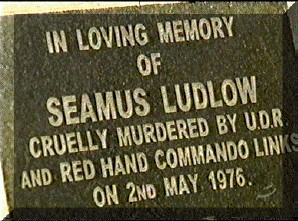The Murder of Seamus Ludlow in County Louth, May 1976. Towards a public inquiry?



The Murder of Seamus Ludlow in County Louth, May 1976. Towards a public inquiry?
|
|
Introduction to the murder of Seamus Ludlow and the official cover-up. Michael Cunningham investigation - 1978 The recent Campaign for Truth and Justice. Irish Victims Commission Report. Ludlow family's questions for the RUC (now the PSNI) Jim J. Kane's letter to the N I Human Rights Commission. Jim J. Kane's letter to the RUC Ludlow Family Letter to Bertie Ahern View messages from our original Guestbook Other Ludlow Family Sites.
|
The Irish News, April 1 2004: 'Cory-style bombings probe should be held in the north' By Valerie Robinson Southern Correspondent A controversial inquiry into the 1974 Dublin/Monaghan bombings should be held in Northern Ireland, the Irish government has been told. An Oireachtas sub-committee also recommended that two separate investigations be established in the Republic to determine how garda files on the atrocity went missing and why the force's investigation on the bombings was wound up within months. Over the past eight weeks members of the Joint Committee on Justice, Equality, Defence and Women's Rights had considered the findings of Mr Justice Henry Barron's investigation into the circumstances surrounding the UVF attacks that claimed the lives of 33 people and an unborn baby. Committee chairman Sean Ardagh urged the government to begin pressurising the British authorities to allow a full inquiry into the bombings to take place in Northern Ireland and/or Britain. He said that while an inquiry should ideally be held in the Republic, perpetrators, information and witnesses lay outside the jurisdiction, making it impossible for any Dublin-based inquiry to compel witnesses outside the state to cooperate. "The perpetrators in all probability are in the north, if there was collusion it was in the north, the atrocity was planned in the north, the bombs were prepared in the north so everything leads one to having a public inquiry in the north," he said. Mr Justice Barron had previously complained that the British security forces and Northern Ireland authorities had failed to provide all the information he had sought during his four-year investigation. The committee recommended that the Irish and British governments should agree terms of reference based upon the Weston Park proposals, with a judge of "international stature" appointed to carry out an inquiry. It was also said that if the British government failed to set up an inquiry the Irish government should consider instituting proceedings in the European Court of Human Rights in Strasbourg, pursuant to the European Convention on Human Rights, seeking declaratory relief against the UK requiring it to carry out an appropriate investigation. Mr Ardagh said that the sub-committee had taken all the facts and attempted to "come up with the best resolution". A spokesman for the NIO last night said it had "cooperated fully" with the Barron inquiry and would consider carefully any further representations from the Irish government. Margaret Urwin of Justice for the Forgotten, which represents most of the survivors and bereaved, gave a "very tentative welcome" to the committee's report. She said members were "extremely disappointed" that the committee had stopped short of ordering a full public inquiry but welcomed its acknowledgement that further investigations were needed. "The pressure is now on the Taoiseach to approach the British government and insist on their cooperation with an inquiry," Ms Urwin said. She called for legislation to facilitate the setting up of the two inquiries into the Garda response to the atrocity to be in place before the inquests into the victims' deaths begin on April 27. Taoiseach Bertie Ahern welcomed the report, saying it made considerable progress towards establishing what had happened. The report is to be debated in the Oireachtas with the outcome to be considered by the government. Fine Gael leader Enda Kenny said the committee had dealt with the Barron report in a "very sensitive" way and welcomed the recommendation that a Cory-type investigation should be carried out. He said, however@ "It will be impossible to get to the real truth behind these atrocities without full cooperation from the British authorities. The Taoiseach must use his relationship with Tony Blair to ensure that this is forthcoming." Sinn Fein Dail leader Caoimhghin O Caolain expressed "deep disappointment" that the committee had failed to recommend a public inquiry on the island. The committee's recommendations removed "much of the onus for action from the shoulders of the Irish government", he said. "Nothing short of a full public inquiry carried out on a cross-jurisdictional basis is acceptable,2 he said. "Justice Barron has already carried out an investigation and the committee has had its deliberation on the report. We do not need another Barron inquiry."
Collusion 'likely' according to Barron Report Mr Justice Henry Barron appeared to be laying the foundation for a full public inquiry into the Dublin/Monaghan bombings when he found it 'likely' that elements of the British security forces had colluded with loyalist paramilitaries to carry out the attacks. The judge's report, released in December after a four-year investigation, was unable to establish whether the the British government or any senior police or British army figures had worked with the UVF to plan the car-bomb attacks which killed 33 people and an unborn baby. However, he singled out the Garda for failing to pursue the inquiry with full vigour and make proper use of the information it had obtained in the months after the attacks. He also criticised the then Fine Gael/Labour coalition government, led by taoiseach Liam Cosgrave, for its handling of the crisis. The 300-page Barron report revealed that entire Department of Justice files on the bombings had gone missing without explanation. In January a sub-committee of the Oireachtas Joint Committee on Justice, Equality, Defence and Women's Rights began hearings to decide whether to recommend a full public inquiry. The committee heard from survivors and many of those bereaved, including Alice O'Brien who lost her sister, brother-in-law and their two young children in the Parnell Street bombing in Dublin. She said the government of the day had failed to act while the Garda probe had come to nothing. Derek Byrne, who was 14 when he was injured in the same blast, said he was still undergoing treatment as well as living with the physical and mental scars of his ordeal. Garda Commissioner Noel Conroy rejected suggestions that the force's reports into the attacks had been deliberately mislaid. Mr Conroy's Police Service of Northern Ireland counterpart, Chief Constable Hugh Orde, refused to attend the hearings, as did Secretary of State Paul Murphy and two of his predecessors. In a letter Mr Murphy said no evidence of collusion had been uncovered relating to any members of the RUC, UDR or other British agencies. But the Republic's justice minister, Michael McDowell, and former Irish ambassador to the US Sean Donlon both told the committee that they believed collusion to have taken place. Their claim was supported by former British army ordinance expert Nigel Wylde and Colin Wallace, who was the senior information officer at army headquarters in Northern Ireland in 1974. They both said they believed security forces members and agents to have taken part in the bombings. Irish army ordinance officer Patrick Trears also told the committee that they had received intelligence that a British army officer had armed the bomb planted in Monaghan. Taoiseach Bertie Ahern appeared to cast doubt over the establishment of a public inquiry when he told the Oireachtas committee it was unlikely the British authorities would cooperate further with any future probe. Valerie Robinson
I Homepage I I Top I I Press Coverage I I Barron Inquiry I I Terms of reference for Barron Inquiry I I Fresh Inquest I I Celtic League Support I I New GuestMap Guest Book. I
Justice for the Forgotten at: http://www.dublinmonaghanbombings.org/ The Barron Report on the May 1974 Dublin and Monaghan bombings can be downloaded in pdf format from http://www.irlgov.ie/oireachtas/Committees-29th-D%E1il/jcjedwr-debates/InterimDubMon.pdf Barron Report Final Report on the Report of the Independent Commission of Inquiry into the Dublin and Monaghan Bombings, laid before both Houses of the Oireachtas on 31 March 2004. Full text available at http://www.irlgov.ie/oireachtas/Committees-29th-Dáil/jcjedwr-debates/BarronReportFinal.pdf
See also: Ireland on Sunday, 12 October 2003: Top names linked to Dublin-Monaghan atrocity Bombs report names gardai 'collaborators' The Sunday Independent, 2 November 3003: Net is closing in on Dublin car bombers The Dundalk Democrat, 8 November 2003: Dundalk bombing and Ludlow murder ignored The Dundalk Democrat, 8 November 2003: Family feel inquiry will make little difference The Dundalk Democrat, 8 November 2003: Inquest could be next January The Irish News, 8 November 2003: No mention of Dundalk victims in Barron report The Irish News, 11 November 2003: Interview loyalist over witness claim judge told The Dundalk Democrat, Editorial, 20 December 2003: No cause for optimism following Barron Report The Dundalk Democrat, 20 December 2003: Missing files a matter of concern for Ludlow relatives The Dundalk Democrat, 20 December 2003: Bombing families fear truth will never be known The Irish Daily Star (Northern Edition), 29 January 2004: Family and former British army man hit out Barron "Failed to Serve Truth" Former spy slams report The Irish Daily Star (Northern Edition), 29 January 2004: Family wants truth about murder The Irish Daily Star (Northern Edition), 9 February 2003: 'Shine light on Ludlow files' Family calls for answer Exclusive The Irish News, 11 February, 2004: Ludlow family consider civil case against Garda RTE Television News, online, 23 February 2004: Barron meets relatives of man killed by UDA The Irish News, 24 February 2004: Relatives of 1976 murder victim meet Justice Barron The Irish Daily Star, 24 February 2004: Loyalist murder report hope The Dundalk Democrat, 28 February 2004: Gardai have the Ludlow bullets The Dundalk Democrat, 28 February 2004: Murder on their mind Irish Daily Star (Northern Edition), 1 March 2004: Ludlow nephew calls on Justice Barron to locate bullets that killed his uncle Seamus in 1976 The Irish Daily Star, 1 April 2004: Call for bombings inquiry in U.K. Dail committee reports findings. Copyright © 2004 the Ludlow family. All rights reserved. Revised: April 21, 2004 .
|